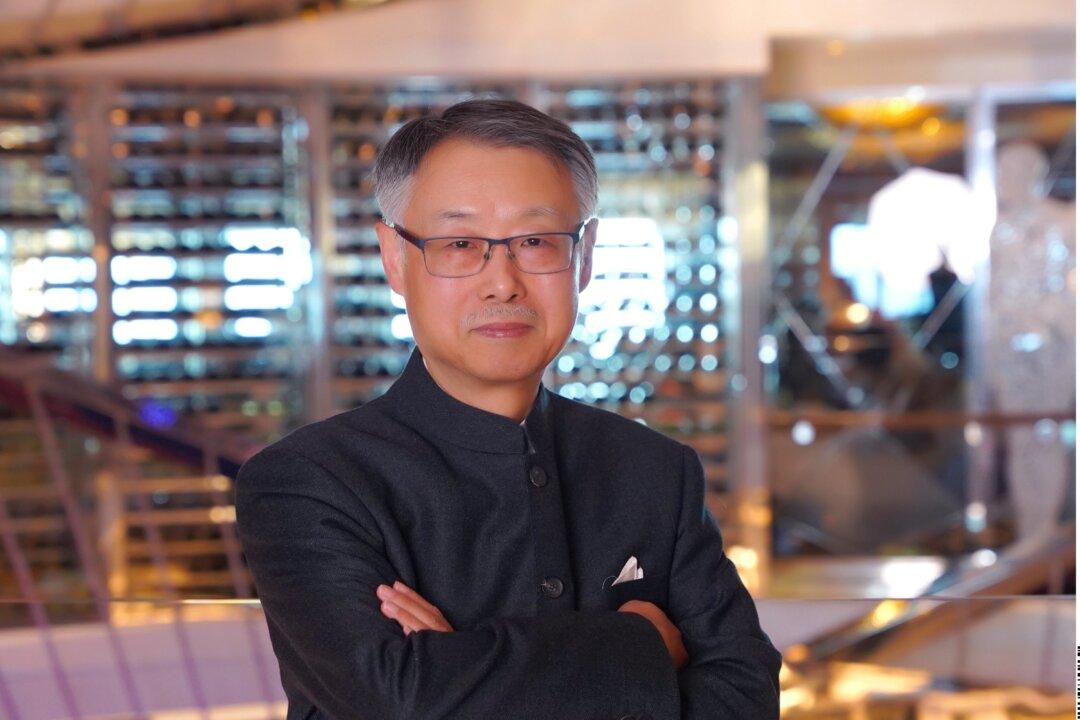
Alberta lawyer Roger Song filed a court action against the Law Society of Alberta in 2023 for mandating “cultural competence” training. Courtesy of Roger Song
Alberta lawyer Roger Song moved to Canada 25 years ago from China to distance himself from a regime he says he could no longer live under.
Having witnessed the 1989 Tiananmen Square massacre–when government forces opened fire on unarmed students demanding democratic reform–he says he saw Canada as a place of freedom where he and his family could start over. He was a law professor at Peking University at the time, and says he witnessed how the regime used its authority to suppress students’ “legitimate demands” for democracy. “I couldn’t allow my children, my next generation, to be still subject to this type of dictatorship,” he told The Epoch Times in an interview. “So that’s why I decided to leave China at that moment.”
But now, he is raising the alarm over what he says is a growing ideological push in Canada that increasingly mirrors the ideological tyranny of communist China. Song filed a lawsuit against the Law Society of Alberta in 2023, over concerns about mandatory cultural training for lawyers imposed by the society–a move he says is similar to what he saw growing up in China.
“Canada is now moving toward the place where I escaped from,” he said.
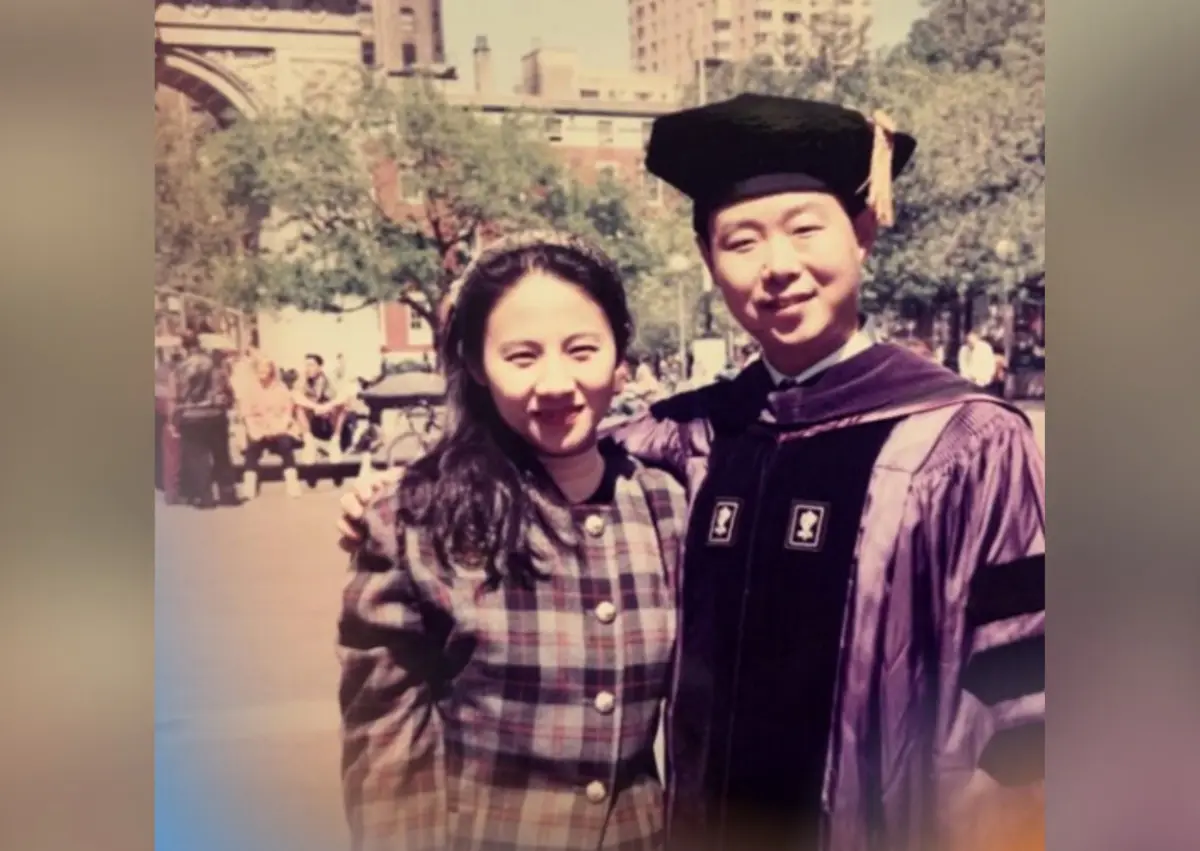
Alberta lawyer Roger Song and his wife, Yan Cao, at Washington Square Park in New York, 1994. Courtesy of Roger Song
In 2019, Song was required to complete “cultural competence” training to maintain his legal credentials in Alberta. He says the society’s professional development program–which covers topics such as diversity, equity and inclusion (DEI), gender identity, and promotes the need to “dismantle systemic inequalities and barriers”–imposes “politicized” requirements and redefines legal competence as adherence to “woke” political beliefs.
He launched a legal challenge in 2023, asking the courts to remove these requirements for lawyers, but the challenge was dismissed this year, with the Court of King’s Bench ruling in a Sept. 12 decision that the training requirements fall under the law society’s scope.
“Having a basic understanding of the people and communities you serve as a lawyer does not work against the public interest. Nor does cultivating a safe work environment built on the principles of evolving human rights law,” reads the decision.
It adds that the law society sees its professional development requirements as “necessary to achieve a greater societal good, and it was within their authority to do so.”
Song argues that compelling lawyers to adopt specific viewpoints goes against the principle of independence of the bar, which the Supreme Court of Canada has described as “one of the hallmarks of a free society.” This principle refers to the ability of lawyers to act in their clients’ best interests, free from undue state or public influence.
“In the area of personal belief, ideology, political issues, it’s an alarming sign if you’re forced to take any type of mandatory training, because if you’re taking mandatory training, that means the content of the mandatory training is considered as the dominant notion, dominant view, dominant attitude, dominant culture of this society,” Song said.
He adds he felt pressured to complete the training because he did not want to lose his licence. “The thing is that if you fail to submit that certificate by deadline, your licence is automatically suspended,” he said.
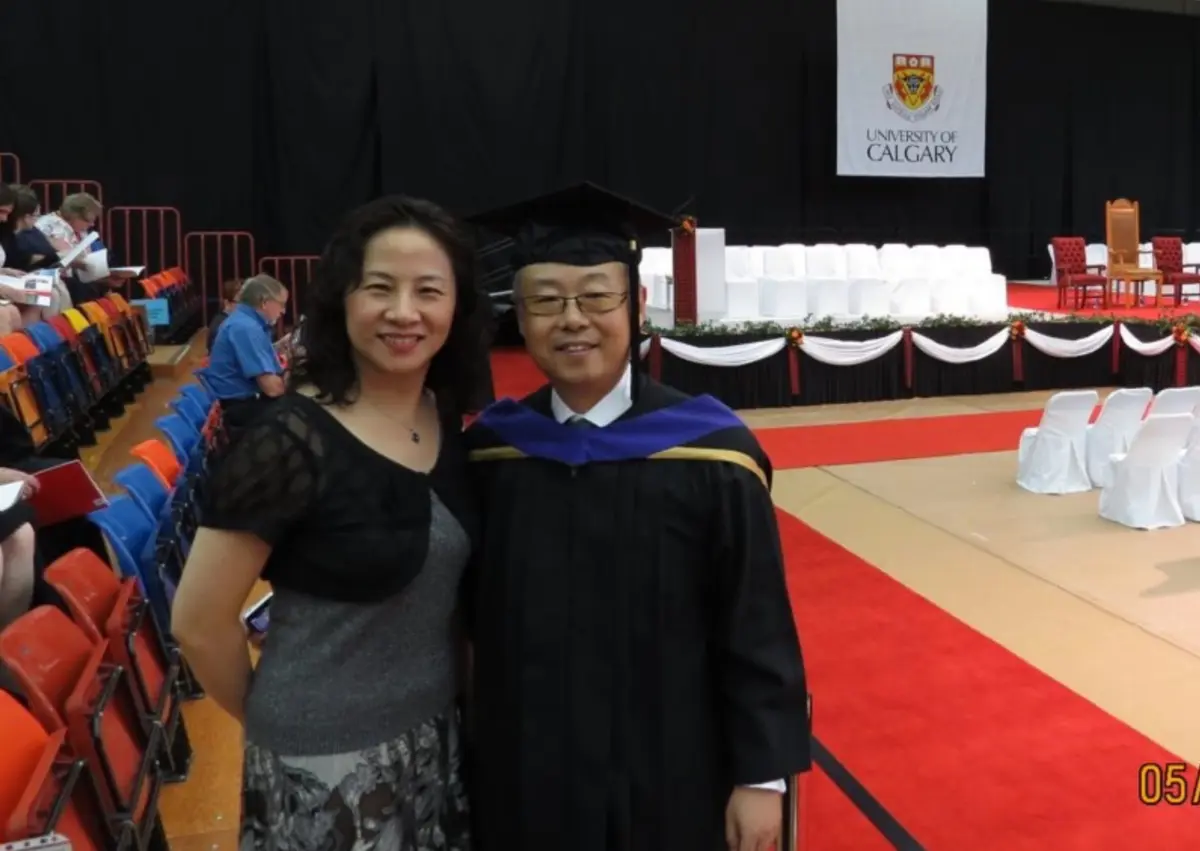
Alberta lawyer Roger Song and his wife, Yan Cao, during Song’s graduation from the University of Calgary Faculty of Law with a Juris Doctor degree in 2013. Courtesy of Roger Song
Song says the law society’s training violates his Charter rights to freedom of conscience and expression, amounting to “compelled speech, forced ideological conformity, and suppression of conscience and expression,” according to the Justice Centre for Constitutional Freedoms, which represents Song in the case.
According to Rule 67.4 of the Law Society of Alberta, the society can “prescribe specific continuing professional development requirements to be completed by members, in a form and manner, as well as time frame.”
Lawyers who do not complete the mandatory training “shall stand automatically suspended” the day after the deadline to complete the course, the rules say.
Law Society’s Position
The law society told The Epoch Times it does not comment on matters before the court.
The society says that Song’s allegations are based on subjective views, and that there is no basis to find that the society has infringed on Song’s Charter rights, according to the Sept. 12 decision.
The society also maintains that its rules and codes of conduct “fall within a reasonable interpretation” of its mandate under the Legal Profession Act, which grants it the authority to regulate the legal profession. It also says that the words, scheme and object of the act support an “expansive construction” of the society’s rule-making authority.
“In [the society’s] view, the competency of the profession, which includes cultural competency and elimination of discrimination and harassment, are inherent to protecting the public’s confidence in the profession,” the document says.
Life Under Communism
Song says that when he first received the law society’s notice on the mandatory training, it “immediately” reminded him of the concept of “political competence” on which he was educated in China.
He recalls that in his home country, people are judged by their acceptance of communist ideology. Those who conform have opportunities to climb the corporate and social ladder, he says, while those who don’t face “social death”–the practice of excluding people who hold differing opinions–which he says is the equivalent of “cancel culture” in Canada.
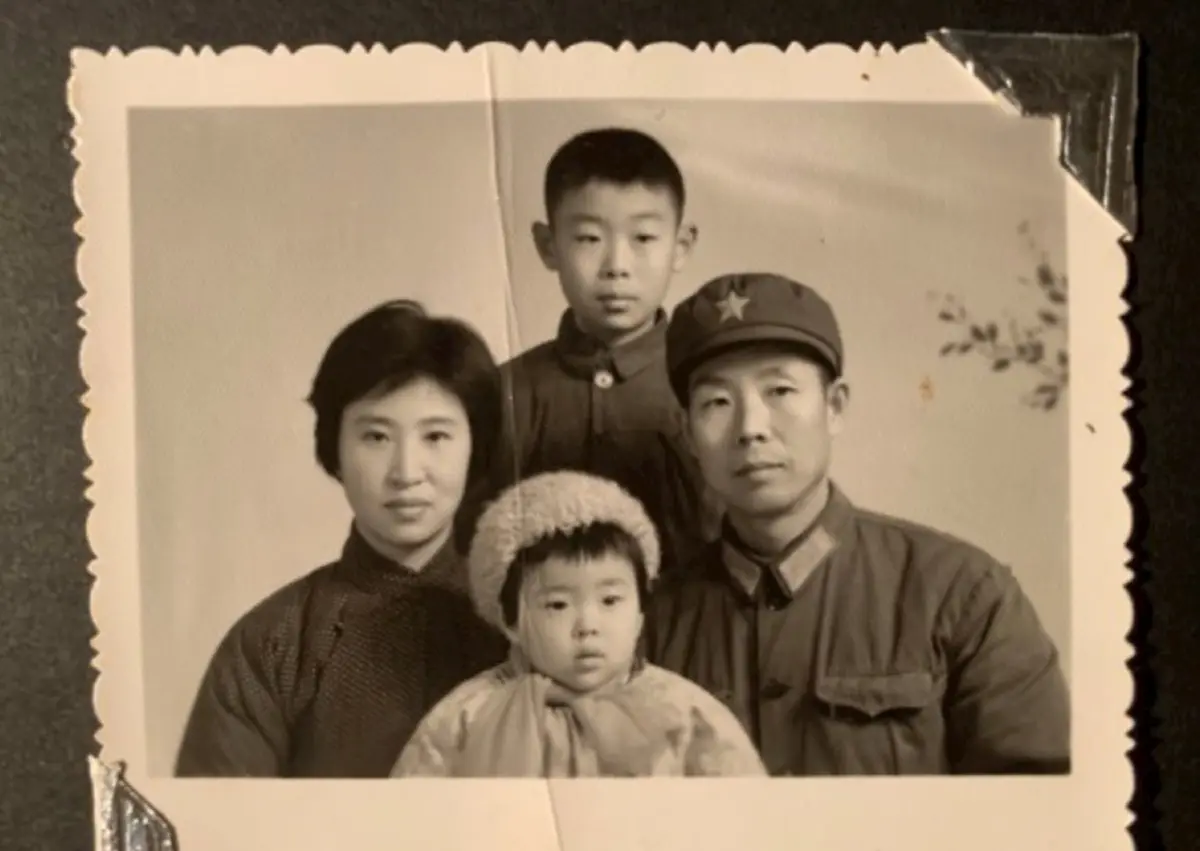
Roger Song as a child (top), with his mother, Lijuan Jia (left), his sister, Li Song, and his father, Ziling Xin (right), during China’s Cultural Revolution in 1974. Courtesy of Roger Song
“Under the communist regime, the trick to survive is to unconditionally support the dictator,” he said. “If you say you unconditionally support the leadership of the Communist Party of China, you may have a good life.”
Song says that after he began voicing his opposition to the Law Society of Alberta’s training, some people around him, including colleagues, began to distance themselves from him.
“People online label me as a racist,” he said. “I’m a Chinese, I was born and raised in China, Mandarin is my native language, and suddenly, just because I express some view that is different from those people, I was labelled racist.”
He added he has also been told to go back to China by people who say he doesn’t conform to Canadian values. “I think that is the culture of cancel culture,” he said.
In China’s case, however, Song says that not conforming to the Communist Party’s ideology can lead to more serious consequences than social exclusion.
He cites the case of his father, Ziling Xin, who, despite being a retired high-ranking army officer in China, was placed under house arrest for three years for promoting constitutional democracy and criticizing corruption among Party officials. Song said his father did not receive any formal legal trial or document imposing the penalty.
“From my dad’s experience, you can see that people in China don’t really have the protection of the law,” he said.
Song says that when he came to Canada, he realized the importance of the rule of law and the supremacy of God, since unlike in China, where the law is tailored to serve the regime’s interests, these principles ensure that the law is applied independently of political influence.
But if lawyers are not allowed to think independently, as he says is the case when regulatory bodies impose mandatory cultural training, it directly undermines the foundation of the legal profession and ultimately affects citizens’ access to fair legal representation.
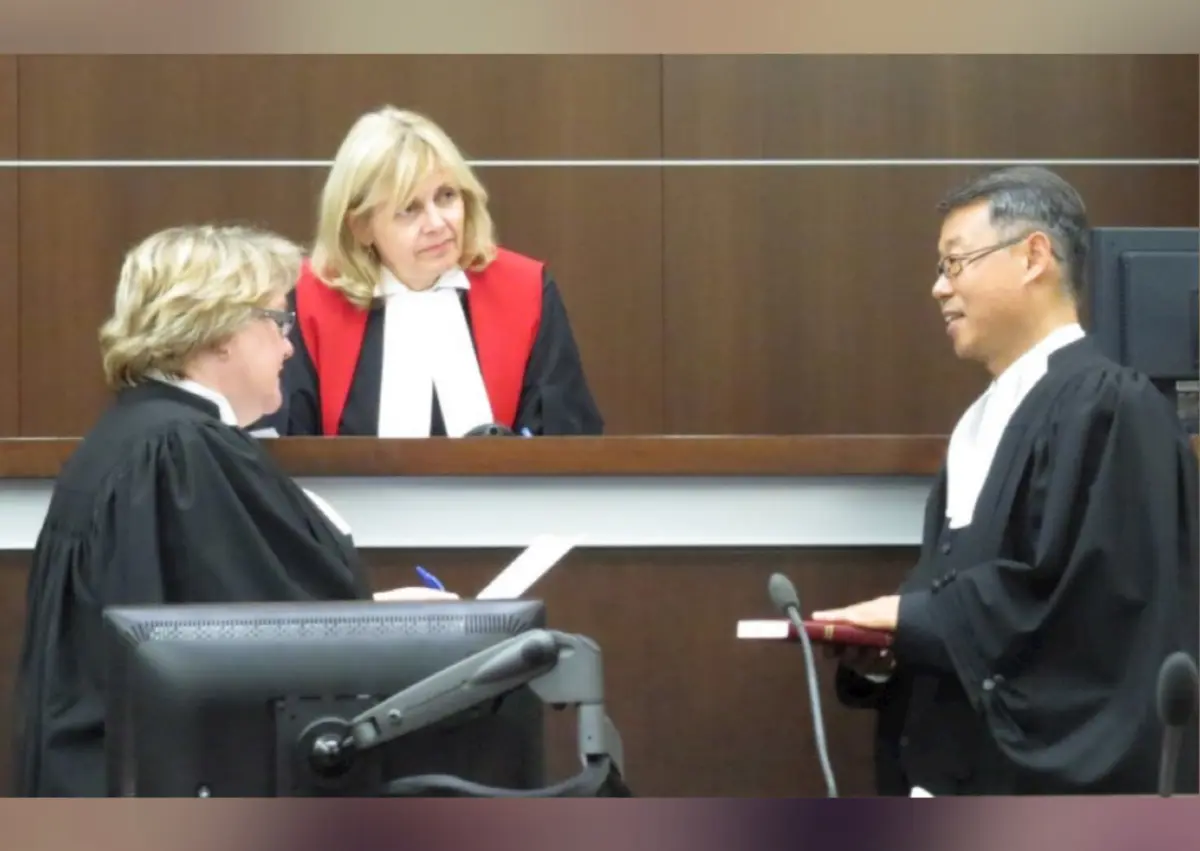
Roger Song (right) taking an oath after being admitted to the Alberta bar on July 28, 2014. Courtesy of Roger Song
“If those judges and lawyers don’t have an independent mind to implement the laws, if those judges and lawyers are subject to all kinds of political influence of authorities, then all the rights granted to the citizens under the laws will come to nothing,” he said.
“Canada is moving away from the foundation.”
‘Social Struggle’
Song says that a sign of communism taking root in Canada is the classification of people into various “identities” to distinguish those who are generally favoured from those who are “discriminated against” or, in communist terms, “oppressed.”
He says this is evident in Canada’s use of gender and racial identity as criteria in a wide range of contexts, from government programs to employment and research funding, under the DEI framework.
“This is not some new trick,” he said. “It’s just another version of communism–playing class identities.”
He recalls that in China, where communism has instilled the ideology of class struggle, a person’s worth is often measured based on their political profile as well as their allegiance and ties to the Chinese Communist Party. He notes that a similar dynamic played out during China’s Cultural Revolution, when supporters of the leftist ideology were favoured, while landlords and wealthy farmers were targeted as class enemies.
“The strategy of wokeness to grab power and control is to engage the struggle of leading the ‘oppressed groups of people’ by identities like gender, sexual orientation, or black or First Nations’ race, to fight against the ‘oppressing group of people’ by identities, like Christians, white, straight, male,” he said.
“Such strategy of social struggle is very effective to create social unrest, division and chaos, and destroy the existing legal regime and social order as Canada already experienced.”
The law society’s professional development documents state that lawyers can demonstrate their cultural and inclusive“competency” by recognizing “how systemic inequalities and barriers affect individuals and groups” as well as “take action to dismantle systemic inequalities and barriers.”
They also encourage attorneys to “develop and promote a deeper understanding of sexual orientation and gender identity” and practice “anti-discrimination and anti-racism.”
Song says that by promoting these views of identity among lawyers, the law society is straying from the principles that everyone is equal under the law and before God.
“The law society is trying to educate lawyers to convert them into a bunch of social justice agents,” he said. “That is very harmful to our legal system and to the protection of the citizens under the law.”
Chandra Philip contributed to this report.